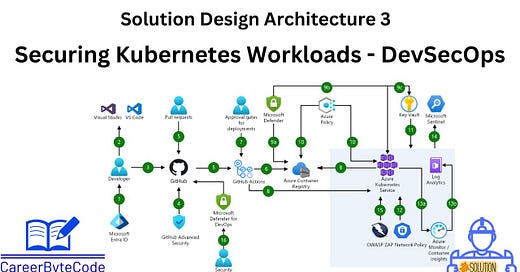Securing Kubernetes Workloads with DevSecOps on Azure
This solution design integrates DevSecOps practices into Azure Kubernetes Service (AKS) to embed security throughout the DevOps lifecycle.
1. Business Scope
Organizations are increasingly adopting Kubernetes for container orchestration, but the lack of integrated security in traditional DevOps pipelines exposes applications and infrastructure to vulnerabilities, compliance issues, and operational risks.
As businesses migrate to containerized environments for agility, scalability, and faster time-to-market, the inherent complexity of these environments introduces multiple security challenges. Kubernetes is powerful for container orchestration, but its default configurations often lack robust security mechanisms. Additionally, traditional DevOps pipelines are designed for speed and agility but rarely prioritize security, resulting in several problems:
Vulnerabilities in the Codebase: Developers often rely on third-party libraries and components, which may have known vulnerabilities that go undetected without proper scanning tools.
Runtime Risks: Misconfigured Kubernetes clusters, lack of role-based access controls (RBAC), and over-permissioned pods can expose critical workloads to external attacks.
Compliance Gaps: Regulatory requirements, such as GDPR or HIPAA, demand stringent data protection measures. Failing to meet these standards can result in hefty fines.
Operational Inefficiencies: Addressing security vulnerabilities late in the pipeline increases costs, delays deployments, and affects organizational productivity.
By embedding security throughout the DevOps lifecycle, organizations can proactively address these challenges while maintaining agility and innovation.
reference - https://learn.microsoft.com/en-us/azure/architecture/guide/devsecops/devsecops-on-aks






